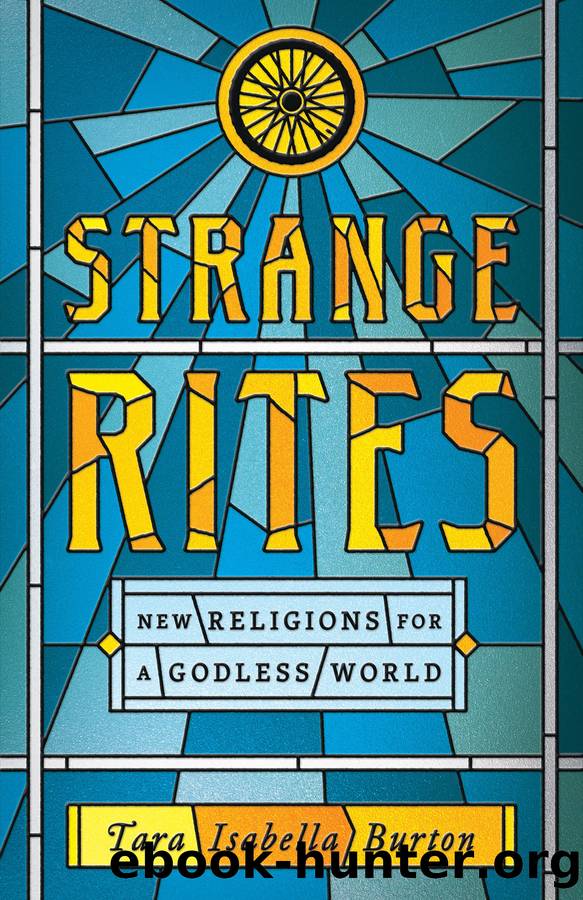Strange Rites by Tara Isabella Burton

Author:Tara Isabella Burton [BURTON, TARA ISABELLA]
Language: eng
Format: epub
Publisher: PublicAffairs
Published: 2020-05-19T00:00:00+00:00
AMONG THE MOST PROMINENT OF THE NEW SEXUAL-SOCIAL IDENTITIES is the practice known as polyamory. Also known as ethical nonmonogamy, polyamory—the practice of having multiple romantic or sexual partners, with the full knowledge and consent of all involved—has, over the past decade, expanded from a seemingly fringe curiosity to one socially acceptable romantic model among many. Open relationships, “monogamish” relationships, “relationship anarchy,” and “throuples” all fall well within the Overton window of culturally discussed dating options.
In 2009, Newsweek’s Jessica Bennett kicked off polyamory’s entrée into mainstream culture by asking if the practice was—to quote the piece’s headline—the “new sexual revolution.” At that time, Bennett estimated that there were about half a million polyamorous families in America.
A decade later, that sexual revolution seems to have come to pass. Nearly every mainstream media outlet has published one, if not several, pieces on polyamory as the next frontier for sexual freedom.
In 2012, the cable TV network Showtime premiered a reality show, Polyamory: Married and Dating, which ran for two seasons. In 2013, it was Scientific American, echoing Bennett’s phrasing and calling polyamory a “sexual revolution.” In 2014, the Atlantic concluded that “poly and mono relationships are more alike than they are different.” In 2017, the Guardian’s Sunday paper, the Observer, praised polyamory as “a new way to love.”9 In 2017, the New York Times asked, “Is an Open Marriage a Happier Marriage?”10 Two years later, the paper’s style section ran an extensive photo feature called “It Works for Them,” profiling members of a Brooklyn-based sex-positive “intentional community” called Hacienda.
By 2017, “polyamory” was one of the top-searched terms on Google.11 As many as 5 percent of Americans now identify as polyamorous, with around 20 percent saying they’ve tried ethical nonmonogamy at some point in their lives.12
And even among those who don’t practice it, public attitudes toward polyamory are ever more favorable. A 2015 YouGov poll found that about 25 percent of American adults find polyamory acceptable. That number skyrockets to 58 percent, however, among adults who consider religion “not at all” important, suggesting that attitudes about polyamory are directly correlated with traditional, institutional religiosity.13 For our Remixed, at least, polyamory is a perfectly acceptable and available option.
Download
This site does not store any files on its server. We only index and link to content provided by other sites. Please contact the content providers to delete copyright contents if any and email us, we'll remove relevant links or contents immediately.
The Lost Art of Listening by Michael P. Nichols(6474)
Why I Am Not A Calvinist by Dr. Peter S. Ruckman(3771)
The Rosicrucians by Christopher McIntosh(3050)
Wicca: a guide for the solitary practitioner by Scott Cunningham(2705)
Signature in the Cell: DNA and the Evidence for Intelligent Design by Stephen C. Meyer(2501)
Real Sex by Lauren F. Winner(2476)
The Holy Spirit by Billy Graham(2418)
To Light a Sacred Flame by Silver RavenWolf(2354)
The End of Faith by Sam Harris(2291)
The Gnostic Gospels by Pagels Elaine(2027)
Nine Parts of Desire by Geraldine Brooks(2007)
Waking Up by Sam Harris(1958)
Heavens on Earth by Michael Shermer(1955)
Devil, The by Almond Philip C(1900)
Jesus by Paul Johnson(1888)
The God delusion by Richard Dawkins(1848)
Kundalini by Gopi Krishna(1824)
Chosen by God by R. C. Sproul(1761)
The Nature of Consciousness by Rupert Spira(1689)
